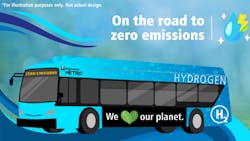King County Metro Transit to explore adding four hydrogen fuel cell buses as early as 2026
King County Metro Transit will explore adding up to four hydrogen fuel cell buses as early as 2026 as part of a pilot project. The zero-emission buses provide extended range, run on hydrogen and emit only water vapor. King County Metro says seeing how hydrogen fuel cell buses perform will dictate if the agency uses them to complement its battery-electric and trolley buses.
The agency says the hydrogen fuel cell bus pilot project has the potential to benefit riders, reduce local air pollution and help tackle global climate change.
“While still delivering everyday, high-quality service to our riders, we’re also leading the way to a zero-emissions future,” said King County Metro General Manager Michelle Allison. “We’re partnering with public entities across our region, encouraging private contractors to develop technologies and learning and sharing each step of the way.”
King County Metro was the first public transit agency in North America to adopt diesel-hybrid buses in 2004. In 2020, the agency retired its last diesel-only buses. Forty battery-electric buses (BEB) from New Flyer of America started entering service in 2022, with another 89 scheduled to begin arriving in 2026 from GILLIG.
While BEBs have an expected range of 140 miles for a 60-foot bus and 220 miles for a 40-foot bus, King County Metro and other transit agencies have experienced range limitations and variability, especially in cold weather. The agency says hydrogen fuel cell buses have the potential to travel up to 300 miles and their extended range has particular promise on all-day, frequent routes.
King County Metro’s BEBs and charging infrastructure are a frequent destination for fact-finding visits by other transit agencies and private contractors. Sustainability is also a major component of the agency’s planning for current and future facilities—such as the Interim Bus Base that broke ground earlier this year.
In 2022, the Federal Transit Administration recognized King County Metro as the U.S.’s most equitable agency in tackling climate change.
